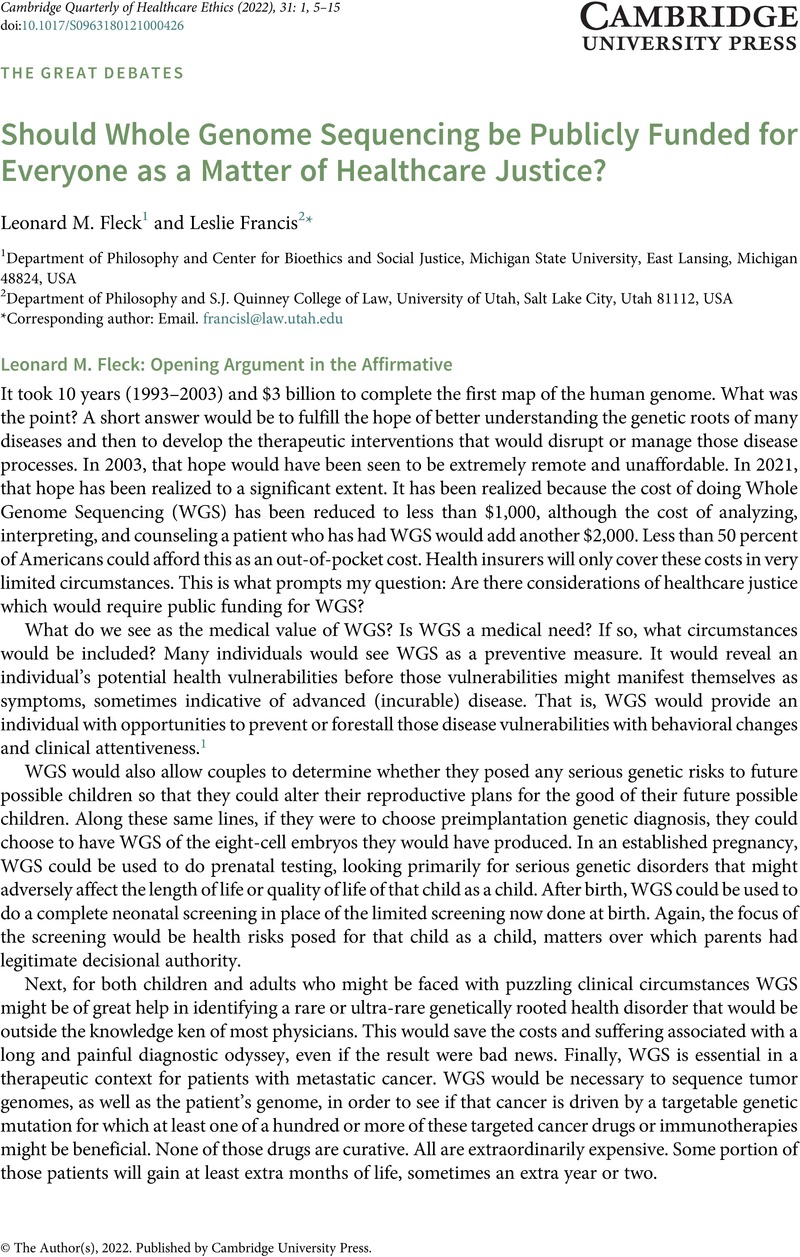Published online by Cambridge University Press: 20 January 2022

1. I will remind the reader that few gene mutations are 100 percent penetrant. Most common diseases are a product of multiple genes in addition to environmental factors that may or may not be known. If someone has the 4/4 variant of APOE, they have an 80 percent risk of Alzheimer’s dementia by their late 60s. They may not alter that genetic fact about themselves, but they may re-order life plans with that knowledge.
2. Park A. Geisinger DNA sequencing program identified genetic risks in 5000 people in its 1st year. Becker’s Hospital Review; 2019 November 5; available at https://www.beckershospitalreview.com/healthcare-information-technology/geisinger-dna-sequencing-program-identified-genetic-risks-in-5-000-people-in-its-1st-year.html (last accessed 10 Mar 2021).
3. In a public health context, think how quickly we were able to identify the original COVID virus, as well as the emerging variants we are now encountering.
4. See Relling, MV, Evans, WE. Pharmacogenomics in the clinic. Nature 2015;526(7573):343–50.CrossRefGoogle ScholarPubMed
5. See Daniels, N. Just Health Care. London: Cambridge University Press; 1985.CrossRefGoogle ScholarPubMed
6. Fleck, LM. Just Caring: Health Care Rationing and Democratic Deliberation. New York: Oxford University Press; 2009.Google Scholar
7. Rawls, J. Political Liberalism. New York: Columbia University Press; 1993, at Lecture VI.Google Scholar
8. The distinction between ideal and non-ideal theory as currently understood stems from John Rawls’s decision in A Theory of Justice to set aside nonideal theory and begin instead with an understanding of ideal justice. In contrast, theorists of justice such as Amartya Sen (2009, vii) argue that justice should be approached in terms of “redressable injustice.” See Rawls, J. A Theory of Justice. Cambridge, MA: Harvard University Press; 1971 CrossRefGoogle Scholar. See also Sen, A. The Idea of Justice. Cambridge: MA: Harvard University Press; 2009 Google Scholar; Valentini, L. Ideal vs. non-ideal theory: A conceptual map. Philosophy Compass 2012;7(9):654–64CrossRefGoogle Scholar.
9. See, for example, National Institutes of Health (NIH). BRCA Exchange aggregates data on thousands of BRCA variants to inform understanding of cancer risk; 2019 January 9; available at https://www.nih.gov/news-events/news-releases/brca-exchange-aggregates-data-thousands-brca-variants-inform-understanding-cancer-risk (last accessed 15 Mar 2021).
10. See, for example, ARUP Laboratories. Cytochrome P450 Genotyping Panel; 2021; available at https://ltd.aruplab.com/Tests/Pub/3001524 (last accessed 15 March 2021).
11. American Society of Clinical Oncology (ASCO). 2020. Lynch Syndrome. Cancer.net (01/2020); available at https://www.cancer.net/cancer-types/lynch-syndrome#:~:text=Lynch%20syndrome%2C%20also%20known%20as,of%20certain%20types%20of%20cancer (last accessed 15 March 2021).
12. Alzheimer’s association. Is Alzheimer’s genetic? 2021; available at https://www.alz.org/alzheimers-dementia/what-is-alzheimers/causes-and-risk-factors/genetics (last accessed 15 March 2021).
13. Musunuru, K, Herschberger, RE, Day, SM, Klinedinst, NJ, Landstrom, AP, Parikh, VN, et al. Genetic testing for inherited cardiovascular diseases: A scientific statement from the American Heart Association. Circulation: Genomic and Precision Medicine 2020;3(4):e000067. https://doi.org/10.1161/HCG.0000000000000067.Google Scholar
14. National Cancer Institute (NCI). Biomarker testing for cancer treatment; 2021 February 26; available at https://www.cancer.gov/about-cancer/treatment/types/biomarker-testing-cancer-treatment (last accessed 15 Mar 2021).
15. National Human Genome Research Institute (NHGRI). Polygenic risk scores; 2020 August 11; available at https://www.genome.gov/Health/Genomics-and-Medicine/Polygenic-risk-scores (last accessed 15 Mar 2021).
16. Chan, K, Petros, M. Simple test, complex system: Multifaceted views of newborn screening science, technology, and policy. Global Pediatric Health 2019;6:1–10.CrossRefGoogle ScholarPubMed
17. American Medical Association (AMA). Code of Medical Ethics Opinion 2.2.5; 2021; available at https://www.ama-assn.org/delivering-care/ethics/genetic-testing-children (last accessed 15 Mar 2021).
18. Kious, BM, Docherty, AR, Botkin, JR, Brown, TR, Francis, LP, Gray, DD, et al. Ethical and public health implications for suicide risk: Family and survivor perspectives. Genetics in Medicine 2021;23(2):289–97.CrossRefGoogle ScholarPubMed
19. Abacan, M, Alsubaie, L, Barlow-Stewart, K, Caanen, B, Cordier, C, Courtney, E, et al. The global state of the genetic counseling profession. European Journal of Human Genetics 2019;17:183–97.CrossRefGoogle Scholar
20. College Tuition Compare. Genetic Counseling/Counselor Schools; 2021; available at https://www.collegetuitioncompare.com/majors/51.1509/genetic-counseling-counselor/#:~:text=In%20the%20United%20States%2C%2022,the%20academic%20year%202020%2D2021 (last accessed 15 Mar 2021).
21. Juergens, AK, Francis, LP. Protecting essential information about genetic variants as trade secrets: A problem for public policy? Journal of Law and the Biosciences 2019;5(3):682–705.CrossRefGoogle ScholarPubMed
22. Sentinel. How Sentinel gets its data; 2021; available at https://www.sentinelinitiative.org/about/how-sentinel-gets-its-data (last accessed 15 March 2021).
23. Becker, LC. Reciprocity. Chicago, IL: University of Chicago Press; 1986.Google Scholar
24. See Wojcik, GL, Graff, M, Nishimura, K, Tao, R, Haessler, J, Gignoux, CR, et al. Letter: Genetic analyses of diverse populations improves discovery for complex traits. Nature 2019;570:514–8.CrossRefGoogle Scholar
25. Murphy, E, Tong, JH. The racial composition of forensic DNA databases. California Law Review 2020;108(6); available at https://www.californialawreview.org/print/racial-composition-forensic-dna-databases/ (last accessed 15 Mar 2021).CrossRefGoogle Scholar
26. See Gillborn, D. Softly, softly: Genetics, intelligence and the hidden racism of the new geneticist. Journal of Education Policy 2016;31(4):365–88.CrossRefGoogle Scholar
27. Zhang S. Will the Alt-Right promote a new kind of racist genetics? The Atlantic; 2016 December 29; available at https://www.theatlantic.com/science/archive/2016/12/genetics-race-ancestry-tests/510962/ (last accessed 15 Mar 2021).
28. Tsosie, R. Cultural challenges to biotechnology: Native American genetic resources and the concept of cultural harm. Journal of Law, Medicine, and Ethics 2007;35(3):396–411.CrossRefGoogle ScholarPubMed
29. Wolff, J, de-Shalit, A. Disadvantage. Oxford, UK: Oxford University Press; 2007.CrossRefGoogle Scholar
30. Duncavage, EJ, Schroeder, MC, O’Laughlin, M, Wilson, R, MacMillan, S, Bohannon, A, et al. Genome sequencing as an alternative to cytogenetic analysis in myeloid cancers. New England Journal of Medicine 2021;384:924–35.CrossRefGoogle ScholarPubMed